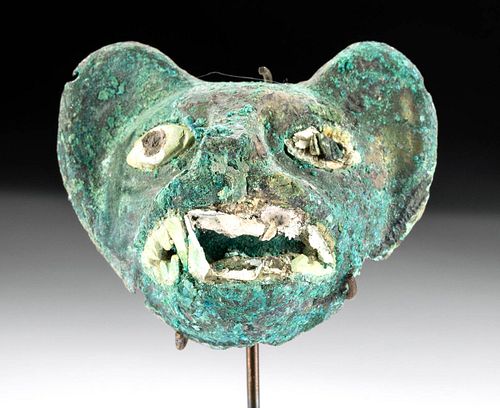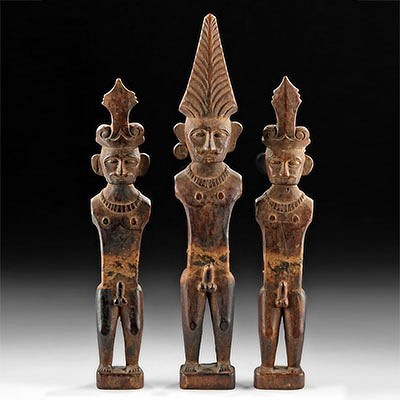Moche Copper Jaguar Head with Shell Inlay
Lot 117c
About Seller
Artemis Gallery
686 S Taylor Ave, Ste 106
Louisville, CO 80027
United States
Selling antiquities, ancient and ethnographic art online since 1993, Artemis Gallery specializes in Classical Antiquities (Egyptian, Greek, Roman, Near Eastern), Asian, Pre-Columbian, African / Tribal / Oceanographic art. Our extensive inventory includes pottery, stone, metal, wood, glass and textil...Read more
Estimate:
$800 - $1,200
Absentee vs Live bid
Two ways to bid:
- Leave a max absentee bid and the platform will bid on your behalf up to your maximum bid during the live auction.
- Bid live during the auction and your bids will be submitted real-time to the auctioneer.
Bid Increments
| Price | Bid Increment |
|---|---|
| $0 | $25 |
| $300 | $50 |
| $1,000 | $100 |
| $2,000 | $250 |
| $5,000 | $500 |
| $10,000 | $1,000 |
| $20,000 | $2,500 |
| $50,000 | $5,000 |
| $100,000 | $10,000 |
| $200,000 | $20,000 |
About Auction
By Artemis Gallery
Jun 25, 2020
Set Reminder
2020-06-25 10:00:00
2020-06-25 10:00:00
America/New_York
Bidsquare
Bidsquare : CLEARANCE - Ancient, Pre-Columbian, Ethno Art
https://www.bidsquare.com/auctions/artemis-gallery/clearance---ancient-pre-columbian-ethno-art-5264
Featuring discounted pricing on antiquities from Egypt, Greece, Italy, and the Near East...plus Viking, Asian, Pre-Columbian, Tribal, Russian Icons, Spanish Colonial, Fine Art, more! Starting prices have been reduced up to 65% from original auction prices - perfect for dealers and collectors. Artemis Gallery info@artemisgallery.com
Featuring discounted pricing on antiquities from Egypt, Greece, Italy, and the Near East...plus Viking, Asian, Pre-Columbian, Tribal, Russian Icons, Spanish Colonial, Fine Art, more! Starting prices have been reduced up to 65% from original auction prices - perfect for dealers and collectors. Artemis Gallery info@artemisgallery.com
- Lot Description
**Originally Listed At $600**
Pre-Columbian, North Coast Peru, Moche, ca. 300 to 500 CE. An impressive miniature jaguar maskette, its fierce visage made from adeptly hammered copper sheet with skillfully modeled bold facial features and white shell inlays accentuating its eyes, teeth, and fangs, presumably for decorative ornaments. The dramatic visage of this jaguar mask - with those leering eyes and that ferocious mouth full of fangs and gnashing teeth - suggests that the artist who created it was more interested in capturing the powerful symbolism associated with this formidable King of Beasts rather than putting forth a naturalistic representation. Size: 2.375" W x 2" H (6 cm x 5.1 cm); 3.125" H (7.9 cm) on included custom stand.
The jaguar symbolized power and might throughout the Pre-Columbian world. Warriors, rulers, hunters, and shamans alike associated themselves with this king of beasts, the largest and most powerful feline in the New World. The principal Moche god wears a headdress adorned with a jaguar head and paws and important mortals donned similar headdresses. A nocturnal animal, the jaguar sleeps in caves and dark places and creeps quietly in the forest, evoking great mystery. Oddly enough, few Moche artists would have actually scene jaguars as they are not indigenous to the coast. Jaguars prefer moist forest conditions. However, scholars believe that some cubs were transported over the mountains for Moche rituals, and it is also possible that some jaguars wandered down the coast.
Provenance: ex-private Orlando, Florida, USA collection, ex Arte Primitivo Gallery, NYC, acquired in the 1980's
All items legal to buy/sell under U.S. Statute covering cultural patrimony Code 2600, CHAPTER 14, and are guaranteed to be as described or your money back.
A Certificate of Authenticity will accompany all winning bids.
We ship worldwide and handle all shipping in-house for your convenience.
#150769Small losses to peripheries as shown, including the two perforations at the upper peripheries. Chips and losses to shell inlays in mouth and eyes as shown, but nice remains have survived. Normal surface wear with expected indentations commensurate with age. A tiny perforation inside the mouth. Attractive patina of aqua and forest green hues. Piece may be easily removed from the stand if so desired. In addition the metal component of the stand may easily be removed from the lucite base if desired.Condition
- Shipping Info
-
All shipping is handled in-house for your convenience. Your invoice from Artemis Gallery will include shipping calculation instructions. If in doubt, please inquire BEFORE bidding for estimated shipping costs for individual items.
-
- Buyer's Premium



 EUR
EUR CAD
CAD AUD
AUD GBP
GBP MXN
MXN HKD
HKD CNY
CNY MYR
MYR SEK
SEK SGD
SGD CHF
CHF THB
THB














